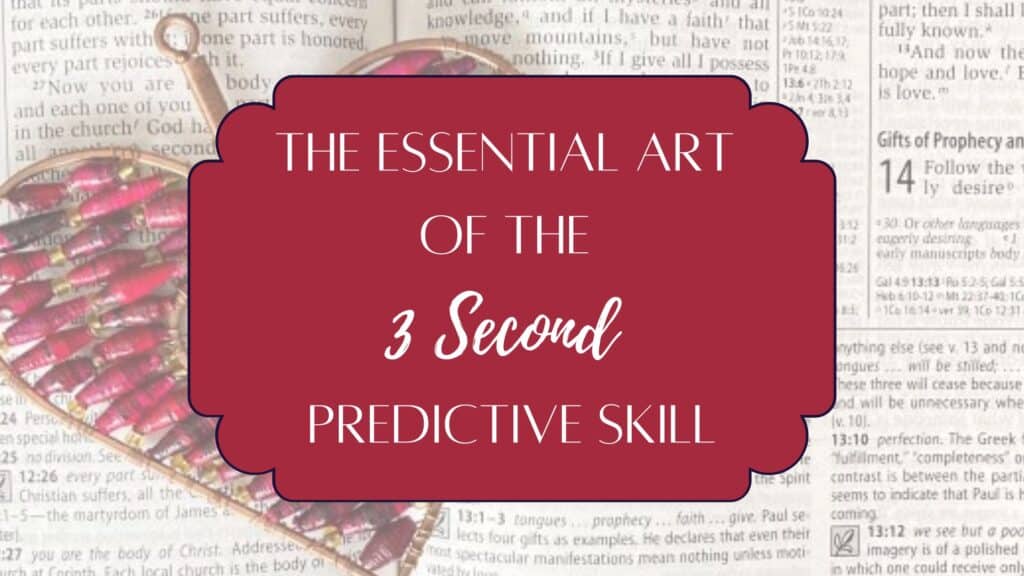What is the 3 second predictive skill? It is the ability to pause and quickly think ahead to what will happen if… For example: What will most likely happen if I say this? What can happen if I put that item in this particular spot? What can happen if I ignore this?
The lightning quick vision of seeing the coming possible reality from these decisions as a mini-instant film replay in the mind. This skill is usually extremely good in parents who have babies and toddlers: seeing a coming fall or reaching for a hot object. It can also be more natural to certain personalities or people who are naturally gifted with logistic skills. For most of us though, it takes practice.
But have we lost touch with this skill lately?
How many of our actions and emotions are stemming from not practicing this art? You might think this is a silly and childish exercise, but actually is an incredibly useful tool for many scenarios that you may not realize. Ask ourselves in a brutally honest way when was the last time we were frustrated or angry: was it actually the result of not practicing this skill and our frustration was the natural result of it?
I know for myself, I will get frustrated and then angry about dinner when really, if I peel back all the layers of excuses, I was lazy or forgot to pause and think ahead. Or maybe in other scenarios, I said something without a pause to think about it and wounded someone’s feelings unnecessarily.
The Calm of the Pause
Did you ever wonder why grandparents typically seem so much wiser or certain people seem to have a higher level of wisdom? Or why do some people have a calmness in situations that we aspire to but just can’t seem to get there? There are many answers to these questions but one of them may be the automatic and practiced use of this skill.

A couple of years ago I introduced this concept to my kids who are huge fans of Calvin and Hobbes. Calvin’s life is mostly centered around not having this skill. What will happen if I (Calvin) play baseball in the living room, move the car into a hole, ride the wagon down this dangerous hill, steal Sally’s doll? These are fun and humorous to read.
As with all children, the ability to make wiser decisions is a natural part of growing up and doesn’t stop just because we reach adulthood. We continually are learning from life experience and that will only make the 3 second predictive skill more and more well-rounded as we go. You can picture it as moving up to a new colored belt in martial arts until you are practicing this skill as a black belt level.
But sometimes as adults, we get lazy. Yes, in life we get used to our routine of constant mind busy-ness. We get bogged down rushing from here to there. Needing to be 2 places at one time. Having a list for a list. Our minds are taken with schedules and when we have a free moment, our minds are filled with entertainment. How many of us automatically pull out our phone when we have a few seconds of wait time? This constant stimulation from schedules and input actually dims and sometimes completely shuts off the ability to use the 3 second predictive skill.

Why It Matters as a Christian?
As a Christian we are to reflect Jesus and be a light to the world and point others to Him. Yes, we are not perfect and still struggle with our fleshly sin nature but as we delve more into God’s word and gain more wisdom, we can succeed in more situations, especially with our words. I would call the 3 second predictive skill part of wisdom, quickly assessing our words or actions and whether they will bring glory to God or not. To be a light and a witness to a dark world, it is imperative that we do this.
“Death and life are in the power of the tongue, and those who love it will eat its fruit.” Psalm18:21 NLV
Pausing and taking stock of the situation for those brief seconds can make all the difference:
“The words of the reckless pierce like swords,
but the tongue of the wise brings healing.” Proverbs 12:18 NIV
This is so very hard to do sometimes, waiting just that little pause before we speak. Developing patience and wisdom in life’s circumstances will help us to cultivate the self-control to practice that 3 seconds pause in the heat of the moment, crossing over from reaction to engagement.
3 Seconds is Part of Wisdom
What is wisdom?
The ability to make sound and discerning decisions. To know how to apply and use the knowledge that your head knows. To be able to judge clearly the right path to go. In the Bible, the fear (respect and acknowledging the authority of God) of God is the beginning of wisdom:
“The fear of the Lord is the beginning of wisdom,
Proverbs 9:10 NIV
and knowledge of the Holy One is understanding.”
Where does it come from?
Only the Lord can give wisdom by asking Him and studying His words:
“My son, if you accept my words
Proverbs 2:1-6 NIV
and store up my commands within you,
2 turning your ear to wisdom
and applying your heart to understanding—
3 indeed, if you call out for insight
and cry aloud for understanding,
4 and if you look for it as for silver
and search for it as for hidden treasure,
5 then you will understand the fear of the Lord
and find the knowledge of God.
6 For the Lord gives wisdom;
from his mouth come knowledge and understanding.”
3 Seconds is part of Self-Control and Ultimately Love
To pause and think before you speak or do is a sign of maturing in our knowledge and wisdom, a result of self-control that leads to love. Having love for others is showing a part of the God of love we serve to a broken world that desperately needs and seeks it. A concerning trend in today’s world is the lack of empathy or consideration for others. Pausing to really see the other person and quickly think from their perspective for a moment is a huge part of being able to engage through love.

“For this very reason, make every effort to add to your faith goodness; and to goodness, knowledge; and to knowledge, self-control; and to self-control, perseverance; and to perseverance, godliness; and to godliness, mutual affection; and to mutual affection, love. For if you possess these qualities in increasing measure, they will keep you from being ineffective and unproductive in your knowledge of our Lord Jesus Christ.”
2 Peter 1:5-8 NIV
My Dear Brothers and Sisters: Don’t Be a Calvin
If we are not a child anymore, then don’t continue to be like Calvin. As 1 Corinthians 13 admonishes us:
“ When I was a child, I talked like a child, I thought like a child, I reasoned like a child. When I became a man, I put the ways of childhood behind me.”
1 Corinthians 13:11 NIV

5 Tips to Enhance Your Skills
Ok, so we know that using the 3 second predictive skill is essential as a mature adult and as a Christian. What are some easy steps to practice and enhance this skill?
- Look for ways to force yourself to slow down on purpose. Easy ones are taking the stairs, parking farther away, looking up phone numbers to manually dial instead of using the auto link in your contacts, using hand stirring once in awhile instead of kitchen gadgets and mixers. Ways to force you to practice patience.
- Each night, pause and think about the next day: write a note what’s for dinner and pull out meat to thaw. Because we all forget.
- Practice pulling out your phone less and less. This will be a little tougher since it’s sometimes automatic. If you are in line or in the car waiting, look around and observe people, bring a book. Read different genres or books you wouldn’t have thought about. Try to break that habit of just reaching for the phone at all breaks or waits. Silence or turn off as many notifications as you can to lessen the enticement. In a study by Stothart, Mitchum and Yehnert (2015), it was noted that just receiving notifications increased anxiety and lowered mental performance and attention even if it’s not opened or interact with it.
- Be where you are and be there 100 percent. Most of our day is filled with mental overdrive somewhere “else”. Force your mental space to be where you are. Practice looking at the person in front of you or beside you and give your undivided attention. Super tough sometimes until we practice it. Amazing how much impact this can make to the other person. Developing your executive functioning skills as an adult is part of being good stewards of the body God has designed for you. Training these functioning skills in your children is steering them to use their mind in training for God’s direction as well.
- Most of all: be in the Word. We can’t know what to practice if we don’t know what God says about it. Look up in your concordance all the passages on patience, self-control, mouth, wisdom, foolishness, and the entire chapter of 1 Corinthians 13. Work your way through them and write down the ones that are speaking to you. There are quite a lot of verses in these lists so your patience and mental presence will be training already by taking the time to do this.
Have a fruitful day as we enjoy the calm of the pause.



